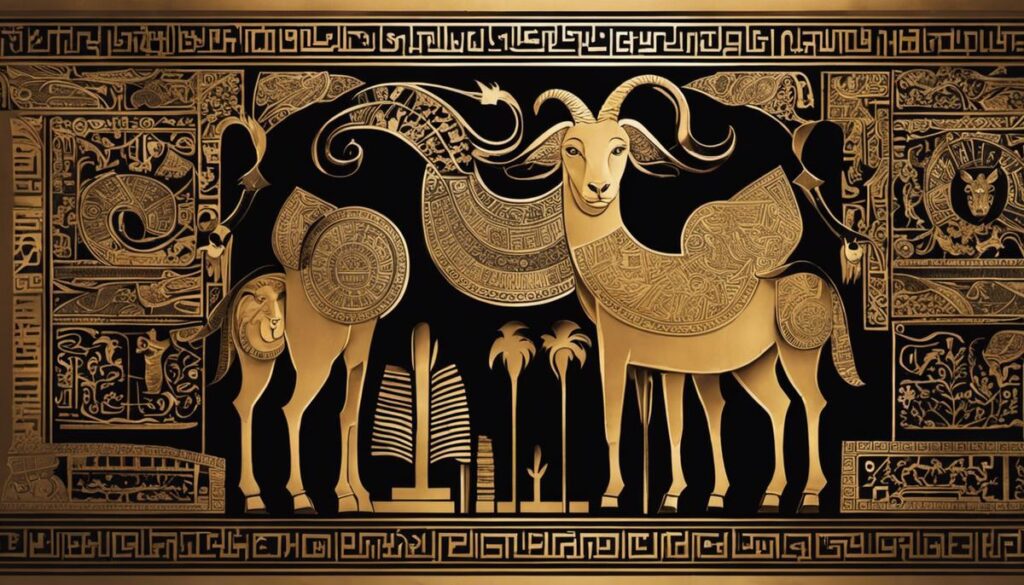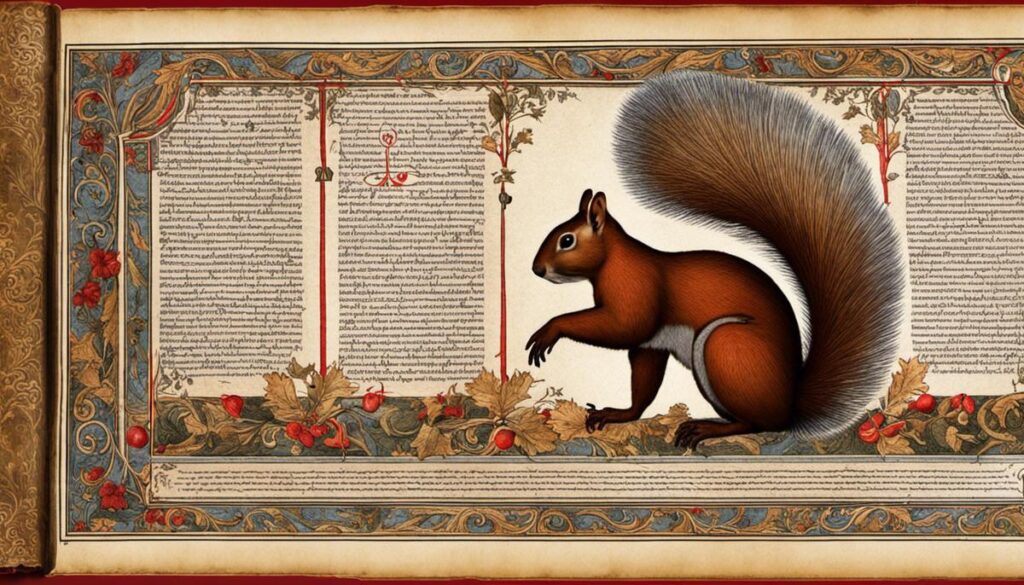The intricacies and complexities of dreams have intrigued and confounded humanity since the beginning of consciousness. Across cultures and religions, dreams have been perceived differently, ranging from rooms for prophetic revelations to platforms for exploring one’s subconscious. A particularly poignant aspect of dream interpretation is understanding the contextual symbolism of certain elements, such as ants. In Christianity, the Bible offers a rich tapestry of spiritual, communal, and metaphysical insights, and even though they appear infrequently, ants hold a considerable symbolic importance within this sacred text, emphasized by their diligence, foresight, and community ethics. This journey explores the biblical interpretation of ant symbolism within dreams, blurring the lines between the ancient spiritual wisdom and the modern reality.
Contextual Understanding of Ants in the Bible
Ants in Biblical Texts: Symbolism and Metaphorical Significance
Ants, despite being diminutive in size, prominently feature in the annals of human literature, philosophy and, most importantly, religious texts. They often devolve into complex symbols embroidered on the canvas of human understanding and sentiment. A Notable mention of these industrious insects that stimulates thought is found in the texts of the Bible. The Book, bearing tremendous cultural and religious significance globally, adopts the ant as a figurative device to extrapolate several fundamental human virtues and moral values.
Within the Proverbs, a book touted for its sapiential literature, the diligent nature of ants is emphatically highlighted. Proverbs 6:6-8 lays the foundation: “Go to the ant, you sluggard; consider its ways and be wise! It has no commander, no overseer or ruler, yet it stores its provisions in summer and gathers its food at harvest”. Explicating these verses unravels the authority imbued within the ant as a metaphorical symbol.
This metaphor is indicative of an exhortation towards individualism, self-sufficiency, teamwork, and foresight. The scriptural context of the sluggard, embodying laziness, contrasts starkly with the work ethic of the ants, thereby metaphorically underscoring the importance of industriousness in human virtue. The independent food gathering and storage strategy of the ants, in the absence of a taskmaster, serves as an admonishment to human society to develop self-directed work ethics, promote autonomy, and strive for efficiency.
Further analysis of the biblical text also reveals subtle yet profound layers of significance attributed to the ant metaphor. The assiduous nature of ants in storing provisions during summer, reflective of strategic foresight and prudence, is coupled with the Parable of the Ten Virgins in Matthew 25:1-13. Here, the foolish virgins, with their lamps dwindling, are criticized for not having adequate oil—a metaphorical lesson paralleling the ant’s prioritization of essential resource allocation in times of abundance against periods of scarcity.
Biblical ecology, a burgeoning field of theological enquiry, further hones in on the ant as a representation of harmonious living within the broader ecological framework. The ant, in this scope, is a reminder of humans’ call for stewardship and beneficent conduct towards the Earth and its diverse inhabitants. Moreover, the social structure of ant colonies, epitomizing cooperation and shared responsibility, is frequently alluded to as a communal model for humans.
Remarkably, the ants’ ability to establish vast colonies, withstand arduous conditions, and embody unflagging diligence, all encapsulated within their tiny bodies, makes them potent metaphorical figures in biblical texts. A deep dive into these contexts unfurls an array of lessons bundled around character virtues, societal norms, and ecological admonitions. Therefore, the humble ant, amplified through the grandeur of biblical literature, becomes a beacon guiding humanity towards a path of wisdom, efficiency, foresight, and respect for ecological integrities.

Dream Analysis in Theological Studies
With a comprehensive exploration of the symbology of ants in biblical text completed, focus now shifts toward the extensive subject of dreams within the realm of biblical and theological discourses. Indeed, dreams held a place of high significance in the era of the old and new testaments, acting as divine conduits of communication. They were perceived as effective mediums through which the divine presence laid a connection with man, primarily for prophetic revelations.
One prominent example is Joseph, the “dreamer” in the book of Genesis, who was granted divine insights through dreams. The interpretation of his dreams played a vital role in shaping the course of his life, leading to his rise as an influential figure in Egypt. Furthermore, these dreams and subsequent interpretations contributed to the preservation of his family line during a catastrophic famine.
Similarly, in the New Testament, visionary dreams played an undeniable role in unfolding divine plans. The dream of Joseph, Mary’s betrothed, reassured him about Mary’s extraordinary pregnancy. This serves as an excellent example of dreams guiding crucial decisions in biblical narratives.
Moving towards theological interpretations, early church fathers like Augustine noted the dichotomy of dreams from the pagan perspective versus the Christian viewpoint. Acknowledging dreams as a potential space for temptation and deception, Augustine warned Christians to discern the true source of their dreams. His theological reflections illustrate the church’s ambivalence regarding dreams.
Though the interpretation of dreams largely tapered off after the closing of the biblical canon, Martin Luther, the father of the Protestant Reformation, also viewed dreams as vehicles for divine messages. He considered his dream of an arguing angel as a divine encouragement to translate the New Testament into German.
In the contemporary era, biblical scholars continue to delve into the enigmatic realm of dreams. However, common consensus is inclined towards a cautious approach, aligning with Augustine. The task of distinguishing a divine dream from an ordinary one is deemed an area of theological complexity.
Nonetheless, the position of dreams as a method of divine communication is inarguable in biblical narratives, offering a fascinating blend of human vulnerability and divine interaction. The ambiguity and interpretive flexibility of dreams underscore the intricate nuances of not only human consciousness, but also the dynamics of divine-human relationships presented within the holy text.
Dreams, like the previously mentioned ant metaphors and symbols, serve as insightful windows into biblical theology and reveal the extraordinary ways through which the human and divine realms tangibly intersect. As such, the exploration of dreams within a biblical and theological context remains a compelling field of study, promising enduring opportunities for further research, debate and comprehension.

Photo by wzimmermann on Unsplash
The Confluence of Dream Analysis and Ant Symbolism
Shifting focus to the symbology of ants in biblical text within dreams connects two significant threads of biblical interpretation: the societal importance of ants and the divine messages conveyed via dreams.
The book of Genesis imbues dreams with a weighty significance; Joseph, a significant biblical figure, was a “dreamer” whose life irrevocably transformed through dreams’ interpretations. Intriguingly, these prophetic dreams not only directed the course of his personal life, but also played a pivotal role in the preservation of his family line, a crucial narrative thread woven through the Old Testament.
In the New Testament, too, the symbolism and significance of dreams echo powerfully. Revelatory dreams pervade powerful narratives, encapsulating divine messages and spiritual breakthroughs. Notably, Joseph’s dream instructions regarding Mary, and Joseph of Arimathea’s dream vision of the resurrected Christ, illuminate the instrumental role of dreams in biblical narratives as conduits of divine communication.
Augustine, a key figure in early Christian theology, posited reflections on dreams that guide much of the church’s understanding. His writings revealed a degree of ambivalence but underscored the potential of dreams as a means for divinely guided discernment. More radical views, such as the Protestant Reformer Martin Luther, upheld dreams as vehicles for divine messages.
Modern biblical scholars approach dream interpretations with a cautious balance, acknowledging both their potential symbolism, divine communication, and the risk of speculative interpretations. Their cautious approach reflects an understanding of the inherent ambiguity of dreams and their interpretive flexibility, recognizing that they mirror the complexities and intricacies of human consciousness.
In analyzing the epiphenomena of ‘ant dreams’ in the biblical context, reflections on the delicate interplay between divine-human relationships become evident. By implication, dreams can serve as windows into the narrative structure and theology of the Bible, bridging the gap between everyday human experience and the realm of the divine. The presence of ants within these dreams potentially signals the importance of diligence, industry, and cooperative effort, values which ants embody in their societal structure, and which resonate deeply within the ethical framework of biblical teachings.
Considering the biblical context, the presence of ants in dreams may serve to underscore an individual’s spiritual journey towards personal growth and community engagement. Given the rich tapestry of connotations that ants hold within biblical literature, encompassing themes of communal living and stewardship, such dreams may well serve as a divine call to mirror the diligence and cooperative effort embodied by ants. In essence, ‘ant dreams’ may represent divine invitations to align one’s life more closely with these biblical values and to profoundly engage in matters of faith and society.
All in all, the intersection of ants and dreams within a biblical context brings forward the rich symbology and metaphors underscored by the holy text. It illuminates not just the intricate nuances of divine-human relationships, but also presents an opportunity for believers to delve deeply into their spiritual conscience. By doing so, it allows an individual to glean divine wisdom and guidance, propelling them further on their spiritual journey. It amplifies ‘ant dreams’ as unique spiritual phenomena that foster a deepened sense of self and faith in the divine narrative.

Contemporary Applications of Biblical Dream Interpretations
Gleaning from the multifarious references present in both the Old and New Testaments, dreams are presented as a Divine tool for communication. The Bible depicts dreams as a conduit for the exchange of vital, sometimes cryptic, messages from God to His chosen prophets, kings, and ordinary individuals. It’s significant to note that the Bible doesn’t discount the role of dreams in guiding directives, personal life, and even, at times, history. This perfectly aligns with accounts throughout Genesis where Joseph, renowned as a seer of prophetic dreams, played a pivotal role in preserving his family lineage during a time of severe famine.
Joseph, famously known for his technicolor dreamcoat in Christian and pop culture, was considered an early dream interpreter. Through his dream analysis, he was able to avert a devastating famine, successfully conserving resources to ensure the survival of his family and contributing to the burgeoning Israelite nation. His journey serves as an example of the importance of visionary dreams and their interpretative significance within both personal and communal contexts.
In the wider gamut of biblical narratives, dreams continue to hold a paramount position. The New Testament alone houses numerous instances where dreams dictated course-altering directives. Dreams were vital in providing divine answers, resolving fears, assuaging doubts and bringing new revelations.
Religious scholars like Augustine and Martin Luther hold contrasting views about dreams. Augustine’s theological reflections on dreams demonstrated the early Church’s ambivalence, cautioning against the alleged divine nature of dreams. On the contrary, Luther saw dreams as vehicles for divine messages. He understood dreams to be God’s way of speaking to humans, even if this was met with skepticism by contemporaries.
In today’s era, informed by biblical exegesis and psychological developments, most biblical scholars tread carefully when it comes to interpreting dreams. Recognizing the complexity of the human psyche and acknowledging the interpretive flexibility of dreams, contemporary biblical scholars often eschew literal understandings. The richness of biblical teachings and the diverse array of dream symbols argue for an interpretive approach that is mindful of historical, contextual, and cultural aspects, including the appearance of ants.
Ants in dreams maintain their biblical symbolic representation of individualism, self-sufficiency, teamwork, perseverance, and foresight. They become a Divine call to align one’s life with these vaunted characteristics. As ants sustain their colonies through collective triumphs and adversities, so too can humans maintain their spiritual colonies in the face of life’s ebbs and flows. The vision of an ‘ant dream’ illuminates a path for personal growth and charts the journey of spiritual transformation, much like the ant metaphor found in Proverbs.
To conclude, dreams, with their interpretive flexibility and symbolic richness, serve as portals into both the complexity of human consciousness and the biblical theology of divine-human interactions. Encountering an ‘ant dream’ can be a divine invitation to the dreamer to join in the grand narrative of faith, engaging in harmonious living, demonstrating stewardship, and emulating the industrious nature of ants. It marries the worlds of the seen and unseen, bolstering divine faith, inspiring self-discovery, and fostering spiritual growth in the contemporary world.

The profound exploration of ant symbolism in biblical dreams transcends the boundaries of time and culture. It reminds us that wisdom, while eternal, should not be static but lived and applied. Dream interpretation, especially regarding ants, signify an invitation to reflect on our diligence, foresight, and sense of community, urging us towards growth and evolution. Whether one perceives dreams as divine utterances or psychological manifestations, the ant reminds us continually to pursue wisdom and understanding, traits applauded and upheld in the Bible. Thus, through the lens of biblical dream interpretations, we may discover renewed perspectives towards our subconscious and the significance of its inhabitants like the ant, forming conjectures that are not only steeped in age-old wisdom but also relevant in navigating the enigma of modern life.







